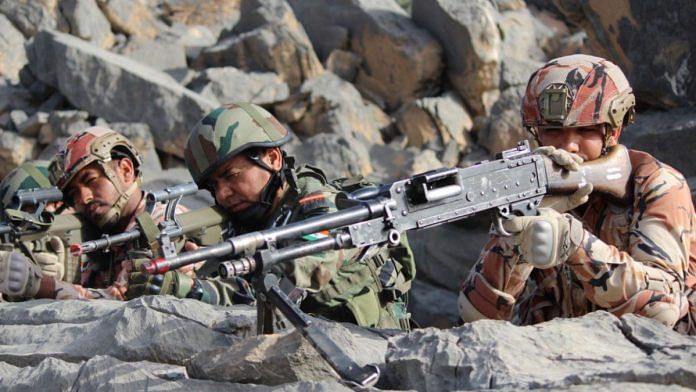It is a no-brainer that religion and caste continue to hold the centre stage in India’s domestic political firmament and impose many obstacles on its developmental path. What is often not acknowledged is that identity issues are also germane to defence reforms. The primary contest is between the identities of civil authorities and the military.
India’s political leadership, which represents the civil identity, would prefer to have the Armed Forces on a tightrope that it can unleash on the nation’s enemies in order to protect national interests. Unquestioning obedience is the political preference and the route taken mostly by authoritarians and despots. But in democracies like India, the leadership is expected to confer and be advised on how and for what purpose should the military be deployed against the adversaries. There is an acceptance that the application and utilisation of violence for political purposes has to be mediated by a process that involves sustained interaction between civil and military leadership. The mediation is imperative because their identities are woven from different types of fabric — the civilian from political rationale and the military from expertise regarding application of violence.
Civil-military identity: Three issues
There are three issues facing civil-military relations that need highlighting. First, politicians as a class would be found lacking in the felicitous understanding of the military instrument and its potential application. Second, military leaders normally fall short in correctly appreciating the political nuances. Third, the natural proclivity of strongman politicians is to expect unquestioned military obedience.
Russia’s military performance in Ukraine could be attributed to an authoritarian Putin who not only lacked proper understanding of his country’s military capability but was also perhaps misled by sycophantic counsel from an obliging and obedient military. Eschewing professional military advice that becomes part of an echo chamber to a strongman is the main lesson. It is a lesson that India should also take seriously because Prime Minister Narendra Modi could definitely be classified in the strongman category. In fact, the emergence of strongman leaders has been a global phenomenon.
Also read: Indian Armed Forces can’t turn a blind eye to religious politics
A recent book, The Age of the Strongman, by Gideon Rachman examines the issue and highlights their common traits: “Typically, these leaders are nationalists and cultural conservatives, with little tolerance for minorities, dissent or interests of foreigners. At home, they claim to be standing for the common man against the ‘globalist’ elites. Overseas, they posture as the embodiments of their nations. And, everywhere they go they encourage a cult of personality.” The author underlines the fact that the strongman feature is not confined to authoritarian systems but is also common among elected politicians in democracies.
The Modi government’s urge to seek unquestioned obedience from India’s military has been most evident in the style adopted for the selection of senior military leadership. It has more or less upended the seniority principle. Nothing illustrates the trend better than the changes made in the rules concerning eligibility for the post of Chief of Defence Staff (CDS), which resulted in appointment of General Anil Chauhan as the second CDS. Then again, India was without a CDS for nearly ten months after the tragic demise of its first incumbent General Bipin Rawat. The political leadership did not clearly display any serious concern as to what could possibly happen to military systems left headless. And if it is indeed aware of the consequences, it couldn’t care less.
What is noteworthy in the appointment order of the second CDS is that his tenure has not been fixed and has been described as ‘until further orders.’ Presumably, he can, if the government so prefers, serve until 2026 when he reaches 65 years of age or alternatively end his tenure whenever the government wants to. The creation of uncertainty in the tenure keeps maximum aspirants in the game including the serving Chiefs as they are eligible as long as they are appointed even a day before reaching their retirement age of 62 years. This system could serve the government with a much larger cohort of conformist military leaders. But, in the larger picture, the strongman could be deprived of professional military advice as his counsel would tend to become echo chambers.
Also read: Theatre commands to defence university, why Indian security interests need a political push
What needs to be done?
To ward off what is an evident but avoidable trend in civil-military relations, India’s military leadership has to be conscious of the political machinations that are apparently underway. They have to be conscious that the target of the politicians is military identity. An identity that is signified in the uniform and values integrity as its essence. Admittedly, they have no power to prevent political moves except to maintain their professional integrity as experts in the application of violence. Such expertise, due to advances in technology — especially in cyber and space domain— also belongs to the civilian sphere. Deepened civil-military fusion would have to be the order of the day. But what should not be sacrificed in the process is the essence of military identity – character. Failure to do so could cost the country very dear.
The wise learn from other’s mistakes. No reason we cannot, unless limited gain transcends the larger interests as has often been practiced by the strongman. History is our witness.
Lt Gen (Dr) Prakash Menon (retd) is Director, Strategic Studies Programme, Takshashila Institution; former military adviser, National Security Council Secretariat. He tweets @prakashmenon51. Views are personal.
(Edited by Ratan Priya)



